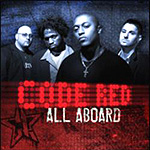
|
Artist: Code Red |
The opening track to the
All Aboard, the debut album from Louisville’s Code Red, is one
of those tracks that makes it easy to get really excited about what’s
coming next. The song, the title track of the album, welcomes us to
the journey we’re all about to travel on with our new hosts, and is
filled with that Southern Fried sound that, at their best, the Atlanta-based
Organized Noize bless us with – laid-back and smooth, country-blues-funk
production accompanied by vocals delivered in a rough, piercing style.
The lyrics are steeped in the self-affirming joy of finally being able
to present a good product to a wide array of listeners and make a living
at one’s chosen craft; coupled with the soul chorus, the addictive
guitar, and the fast beat, the elements make for a stunning combination.
The promise of that first track
unfortunately goes unfulfilled, at least on this album. There are sparks
of the genius of that first track, but for the most part, we are left
with a very good album, albeit one that feels, at times, derivative
and formulaic. Lyrically, the group’s emcees – Manfred, Jr. Dread,
and El One – deliver usually tight lyrics, accompanying catchy choruses,
and effortlessly fuse reggae with rap. Manfred is the frontman of the
group, and his lyrics are often tinged with an introspectiveness that
shows the party tunes are just those – party tunes. Many songs seem
designed for wide consumption, which, frankly, this group deserves.
But on those party tunes, the emcees aren’t the stars, it’s the
production, from some dude named Watz. Some very talented dude.
Throughout the album, Watz’s
production shines; there’s hardly a track that isn’t at least head-nodding.
In fact, perhaps Watz’s production is so radio-worthy that it might
contribute to many songs sounding reminiscent of other people’s work.
Still, the lyrical style of “Elbow Room,” “Sky is Falling,”
and a few other songs are reminiscent of Ludacris’s. Perhaps that’s
more a testament to Luda’s growing influence, but they sound too close
to not be at least a little bit disorienting.
There seem to be a bunch of
the requisite songs for predictable albums on “All Aboard” – the
one for their peeps at home (“For My People”), or the one about
how sex is good but love is complicated (“Looking Good”), or the
one about girls as chickens (“Sky Is Falling”). “Summer Jam”
is, indeed, a good summer jam, as the Debarge sample “I Like It”
accompanied by the varied production and live instrumentation makes
for a party jam that could be enjoyed by as wide an audience as possible.
But while “Summer Jam” seems tailor-made to appeal to audiences
from anywhere in the U.S. (or the world?), the equally enjoyable “Drive
By,” specifically about Louisvile and more Southern in style, seems
more honest.
The party songs also strike
a harsh juxtaposition against the more earnest offerings on the album
– most noticeably “Brother Louis,” about the challenges faced
by an interracial couple, and the antiwar “Give Me A Reason.” That
may be the point, but the social awareness evoked in those songs are
only touched upon briefly elsewhere. This war has become dangerously
close to becoming another Vietnam (if it hasn’t become another one
already), and it’s good to hear that a group poised for major circulation
has taken the risk of professing such fervent antiwar views. That two
members of the group are vets (as the promotional material indicates)
only adds weight to the song, about young people sent to Iraq without
being able to justify their reasons for being there.
That the group is capable of
speaking on such serious and complex topics, and be good at doing it,
only makes the party jams feel lacking in depth. Watz continuously leads
the listener along with praiseworthy beats during those tracks, but
when the emcees don’t say anything that might prompt listeners to
rewind, those tracks sound dumbed down.
That isn’t to say the party
songs are not fun. Watz is a capable enough producer to flip genres
with each track between soul, the blues, reggae, crunk, and golden-age
hip-hop. Most strikingly, The electro-heavy production on “Atomic”
showcases Watz’s skills, as he seemingly effortlessly melds a deep
bass beat, heavy synthesizer, claps, little blips, organs, and flutes
into something that’s unmistakably hip-hop, both future and past,
West Indies and computer chips, soul, funk, rap, techno, reggae. Guitars
and flutes – occasionally played by studio musicians – are often
at the centerpiece of his most original work here, and the distinct
sound – is this Lousville? – is ultimately what holds the album
together. The lyrics all flow well; the quality of the lyrical content
is inconsistent; the production is always on point.
This is a debut album, but
is refined enough that the talent displayed on it sound well-traveled.
The wisdom from those travels frequently appears on the album, but sometimes
feels left by the wayside. Maybe, hopefully, once Code Red acquires
the large crossover audience they’re clearly striving for from this
album, they’ll come back with subsequent efforts that consistently
make people want to move while making them think at the same time.


Leave a Reply